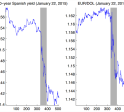Structural reforms: why did the term become so "toxic"?
By Sophie Piton
From May 21 to May 23, the ECB organized its 2nd annual forum on Central banking. Mario Draghi's inaugural speech, as well as discussions on May 23rd, focused mainly on the need for structural reforms to strengthen growth in Europe.






.png)




